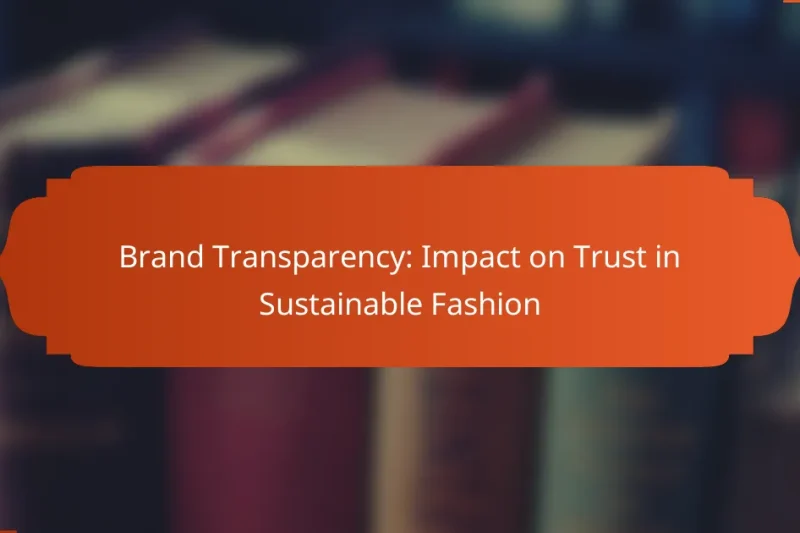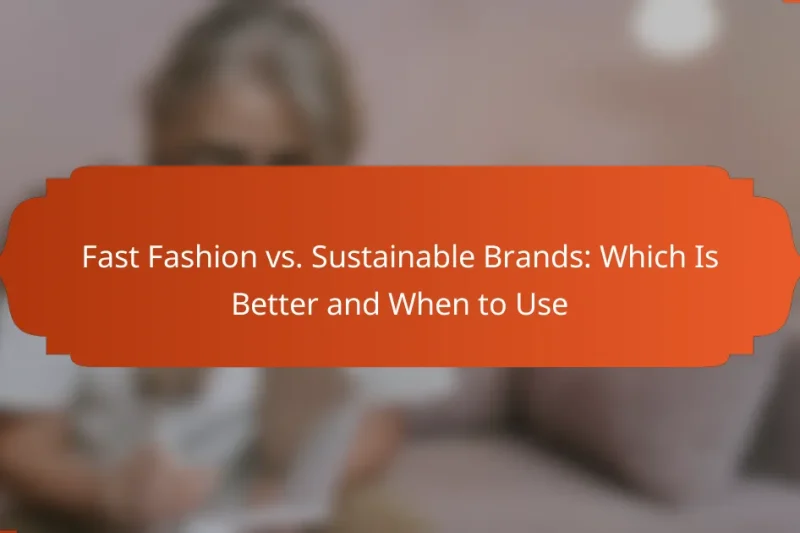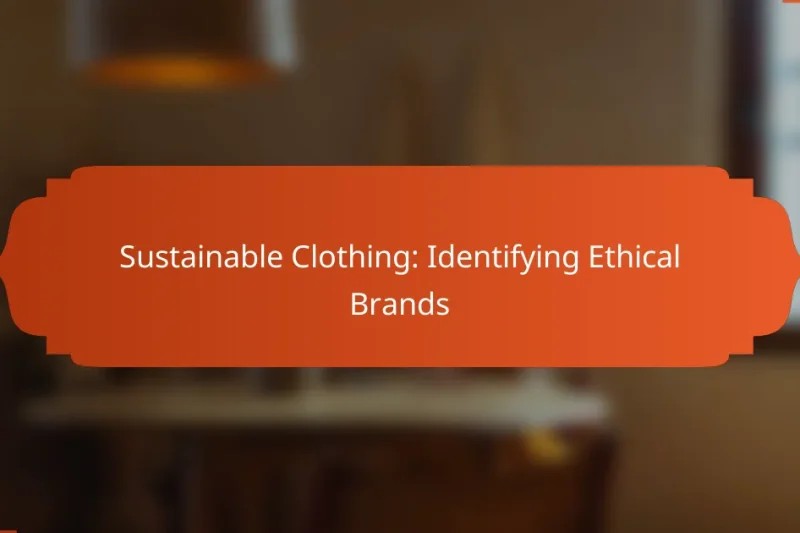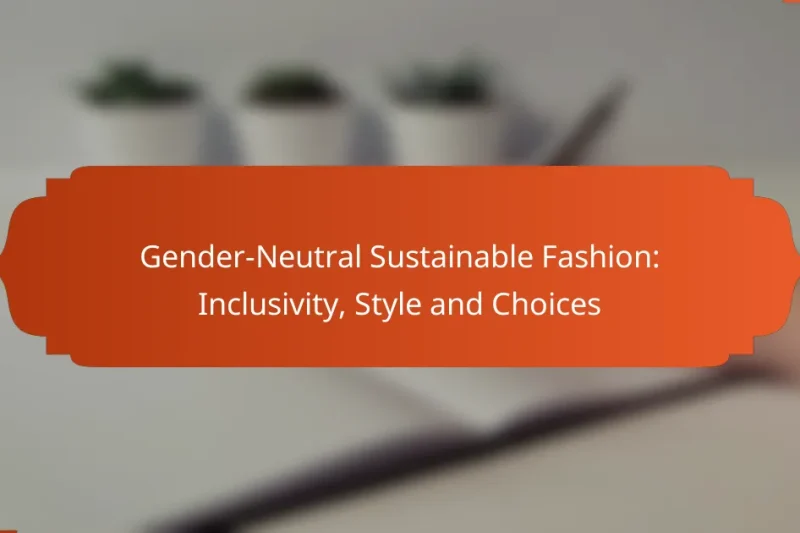Brand transparency plays a crucial role in building trust within the sustainable fashion industry by offering … Brand Transparency: Impact on Trust in Sustainable FashionRead more
Top Sustainable Fashion Brands
Sustainable fashion brands are revolutionizing the industry by prioritizing eco-friendly materials and ethical production practices. Leading names like Patagonia, Everlane, and Reformation exemplify this commitment, offering consumers stylish options that minimize environmental impact. By choosing sustainable fashion, shoppers can support responsible labor practices and contribute to a healthier planet.
Local Sustainable Brands: Community Support and Benefits
Local sustainable brands are essential for nurturing community development by driving economic growth and supporting social … Local Sustainable Brands: Community Support and BenefitsRead more
Fast Fashion vs. Sustainable Brands: Which Is Better and When to Use
The debate between fast fashion and sustainable brands revolves around production methods, environmental impact, and ethical … Fast Fashion vs. Sustainable Brands: Which Is Better and When to UseRead more
Sustainable Brands: Choosing Based on Personal Values
Choosing sustainable brands that align with your personal values is essential for making purchases that reflect … Sustainable Brands: Choosing Based on Personal ValuesRead more
Sustainable Clothing: Identifying Ethical Brands
In today’s fashion landscape, identifying ethical clothing brands is essential for consumers seeking to make responsible … Sustainable Clothing: Identifying Ethical BrandsRead more
Gender-Neutral Sustainable Fashion: Inclusivity, Style and Choices
Gender-neutral sustainable fashion is revolutionizing the way we think about clothing by prioritizing inclusivity and eco-friendly … Gender-Neutral Sustainable Fashion: Inclusivity, Style and ChoicesRead more
Sustainable Clothing Brands: Top Picks for Conscious Consumers
As the demand for eco-friendly fashion grows, several sustainable clothing brands are leading the way with … Sustainable Clothing Brands: Top Picks for Conscious ConsumersRead more
Which sustainable fashion brands are leading in the US?
Several sustainable fashion brands are making significant strides in the US, focusing on eco-friendly materials and ethical production practices. Brands like Patagonia, Everlane, Reformation, Allbirds, and Outerknown are at the forefront, each offering unique approaches to sustainability in fashion.
Patagonia
Patagonia is renowned for its commitment to environmental responsibility and ethical manufacturing. The brand uses recycled materials and offers a repair program to extend the life of its products, encouraging customers to buy less and choose wisely.
Additionally, Patagonia donates a portion of its profits to environmental causes, reinforcing its dedication to sustainability. Their transparency about sourcing and production practices sets a high standard in the industry.
Everlane
Everlane emphasizes “radical transparency” in its pricing and production processes. The brand provides detailed information about the costs associated with each item, allowing consumers to understand where their money goes.
Everlane focuses on using sustainable materials, such as organic cotton and recycled polyester, and partners with ethical factories worldwide. Their commitment to quality and transparency appeals to conscious consumers looking for stylish yet responsible options.
Reformation
Reformation is a popular choice for eco-conscious shoppers, known for its trendy designs and sustainable practices. The brand tracks its environmental impact and shares this information with customers, making it easy to see the benefits of choosing their products.
Reformation uses eco-friendly fabrics and implements energy-efficient practices in its production facilities. Their commitment to sustainability is evident in their collections, which are both fashionable and environmentally friendly.
Allbirds
Allbirds specializes in sustainable footwear made from natural materials like merino wool and eucalyptus tree fibers. The brand focuses on minimizing its carbon footprint and uses a carbon offset program to balance emissions from production.
Allbirds’ shoes are designed for comfort and style, appealing to consumers who prioritize sustainability without sacrificing aesthetics. Their commitment to transparency about material sourcing and production methods enhances their appeal.
Outerknown
Outerknown, co-founded by surfer Kelly Slater, is dedicated to creating stylish clothing with a focus on sustainability. The brand uses organic and recycled materials while ensuring fair labor practices throughout its supply chain.
Outerknown’s collections are designed to be durable and timeless, promoting a “buy less, wear more” philosophy. Their commitment to sustainability is reflected in their certifications and partnerships with organizations that advocate for ethical fashion practices.
How do sustainable fashion brands reduce environmental impact?
Sustainable fashion brands minimize their environmental impact by adopting practices that prioritize eco-friendly materials, ethical production, and waste reduction. These strategies collectively aim to lower carbon footprints and promote a circular economy in the fashion industry.
Use of organic materials
Sustainable fashion brands often utilize organic materials such as cotton, linen, and hemp, which are grown without harmful pesticides and fertilizers. This practice not only reduces soil and water pollution but also promotes biodiversity.
When choosing organic fabrics, look for certifications like GOTS (Global Organic Textile Standard) or OEKO-TEX, which ensure that materials meet strict environmental and social criteria. Brands that focus on organic materials typically offer a range of products, from clothing to accessories, that are better for the planet.
Ethical manufacturing practices
Ethical manufacturing practices involve ensuring fair wages, safe working conditions, and respect for workers’ rights throughout the supply chain. Sustainable brands often partner with factories that adhere to ethical labor standards, which can include certifications such as Fair Trade.
Consumers can support ethical practices by researching brands and looking for transparency in their supply chains. Many sustainable fashion brands provide detailed information about their manufacturing processes, helping customers make informed choices.
Recycling and upcycling initiatives
Recycling and upcycling initiatives help reduce waste by repurposing old garments and materials into new products. Many sustainable fashion brands encourage customers to return used items for recycling or offer repair services to extend the life of clothing.
Brands may also create collections using recycled materials, such as plastic bottles or discarded textiles, which can significantly lower resource consumption. When shopping, consider brands that actively promote recycling programs or have a take-back scheme to minimize your fashion footprint.
What are the benefits of shopping sustainable fashion?
Shopping sustainable fashion offers numerous advantages, including supporting ethical labor practices, reducing carbon footprints, and promoting a circular economy. These benefits contribute to a more responsible and environmentally friendly approach to clothing consumption.
Support for ethical labor practices
Sustainable fashion brands prioritize fair labor conditions, ensuring that workers receive fair wages and work in safe environments. By choosing these brands, consumers help combat exploitation and support businesses that value their employees.
Look for certifications such as Fair Trade or GOTS (Global Organic Textile Standard) to identify brands committed to ethical practices. These labels indicate adherence to strict labor standards and environmental regulations.
Reduction of carbon footprint
Shopping sustainable fashion can significantly lower your carbon footprint compared to fast fashion. Sustainable brands often use eco-friendly materials and production methods that minimize greenhouse gas emissions.
Consider brands that utilize organic cotton, recycled materials, or local production to further reduce environmental impact. Additionally, opting for high-quality items that last longer can decrease the frequency of purchases, leading to less waste.
Promotion of circular economy
The circular economy model focuses on reusing and recycling materials, reducing waste in the fashion industry. Sustainable fashion brands often design products with longevity in mind, encouraging consumers to repair or recycle items instead of discarding them.
Participate in this model by supporting brands that offer take-back programs or resale options. This not only extends the life of clothing but also helps reduce the demand for new resources, fostering a more sustainable fashion ecosystem.
How to choose sustainable fashion brands?
Choosing sustainable fashion brands involves assessing their environmental impact, ethical practices, and commitment to transparency. Focus on certifications, material sourcing, and the brand’s overall transparency to make informed decisions.
Look for certifications
Certifications are crucial indicators of a brand’s commitment to sustainability. Look for labels like Global Organic Textile Standard (GOTS), Fair Trade, and OEKO-TEX, which ensure that products meet specific environmental and social criteria.
Brands with these certifications often adhere to strict guidelines regarding labor practices, chemical usage, and environmental impact. Checking for these labels can help you quickly identify brands that prioritize sustainable practices.
Research brand transparency
Brand transparency refers to how openly a company shares information about its supply chain, production processes, and labor practices. Brands that are transparent often provide detailed insights into where and how their products are made.
Look for brands that publish sustainability reports or have dedicated sections on their websites explaining their practices. This level of openness can help you gauge their authenticity and commitment to sustainability.
Evaluate material sourcing
Material sourcing is a key factor in determining a brand’s sustainability. Brands that use organic, recycled, or sustainably sourced materials tend to have a lower environmental impact. Common sustainable materials include organic cotton, Tencel, and recycled polyester.
When evaluating a brand, check if they disclose the origins of their materials and whether they prioritize eco-friendly options. This can significantly influence the overall sustainability of the products you choose.
What are the price ranges for sustainable fashion?
Sustainable fashion can vary widely in price, typically ranging from budget-friendly items to luxury pieces. Generally, affordable sustainable clothing can be found for under $50, while high-end brands may charge several hundred dollars for their eco-friendly designs.
Affordable options under $50
Many sustainable fashion brands offer stylish and eco-conscious clothing at prices below $50. These options often include basics like t-shirts, leggings, and accessories made from organic or recycled materials.
When shopping for affordable sustainable fashion, consider brands that prioritize ethical production and transparency. Look for certifications such as Fair Trade or GOTS (Global Organic Textile Standard) to ensure that the products meet certain environmental and social criteria.
Examples of affordable sustainable brands include Everlane, which offers a range of basics, and Pact, known for its organic cotton apparel. Shopping during sales or exploring thrift stores can also yield great sustainable finds without breaking the bank.






